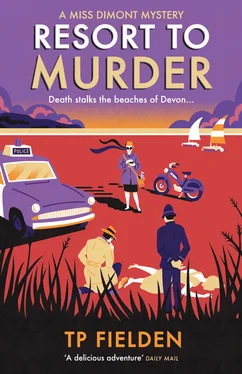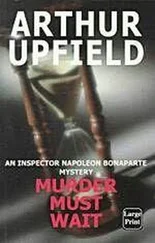You could never say that about Miss Dimont.
‘Who’s covering the murder?’ demanded Ross heatedly.
‘The new boy,’ sighed Betty.
The way she said it carried a wealth of meaning in an office that was accustomed to the constant stream of new talent washing through its revolving doors – in, and then out again. Either they were so good they were snapped up by livelier papers, or else they were useless and posted to a district office, never to be seen again.
‘Another rookie?’ snapped Ross, the venom in his voice sufficient to quell a native uprising. ‘When did he arrive?’
‘This morning,’ said Betty. She’d yet to try out her charms on the newcomer, but as ever she was willing to give it a try – he looked rather sweet, though of course those nasty photographers would be calling her a cradle-snatcher again.
‘Where’s your Townswomen’s Guild story?’ growled Ross, for Betty was not his cup of tea and her bouncy figure left him unmoved.
‘Here you are,’ she trilled, handing over three half-sheets of copy paper bearing all the hallmarks of an afternoon’s attention to the nail-varnish bottle.
‘A stimulating talk was given by Miss A. de Mauny at Temple Regis TWG on Tuesday,’ it began, one might almost say deliberately masking the joys ahead.
‘Titled Lady Rhondda and the Six Point Group it gave a fascinating account of the post-war women’s movement, taking in the …’
She could see Ross’s eyes glaze over as he read on. In truth, she’d found it difficult herself to stay awake during the earnest but dense peroration by the town’s only clock-mender. There weren’t too many jokes in her talk.
‘For … pity’s … sake …’ groaned Ross, a man ever-hungry for sensation. ‘We’re short on space this week. The Six Point Group? Naaaah!’
‘Husbands of TWG members advertise extensively in this newspaper,’ said Betty, primly parroting the words of her editor when she’d protested at having to attend the dreary event.
‘I’ll have to cut it.’
‘Do what you like,’ said Betty. Her mind was already on the evening ahead. A drink perhaps with that new reporter, the start of something new?
And maybe, this time, it could be for ever?
TWO
Miss Dimont sat in the public bar of the Old Jawbones, a beaker of rum on the stool in front of her, surrounded by a group of men – bulky, muscular, unshaven and with the occasional missing tooth – who roared their approval as she raised the glass to her lips and drank.
It was 10 o’clock in the morning.
This scene of depravity had an explanation but not one that could ever find the approval of her editor, the fastidious Rudyard Rhys. A stickler for decorum among his staff, he would shudder at the thought of his chief reporter behaving in so abandoned a fashion. In a filthy old fishermen’s pub! At ten o’clock in the morning!
Miss Dimont didn’t care. She shot a waspish remark at her fellow-drinkers and they burst once more into laughter. One more swig of rum and then, picking up her notebook, she moved slowly and almost steadily towards the door.
‘Whoops-a-daisy, Miss Dimmum!’
‘Don’t you fall down now, Miss Dimmalum!’
‘And doan fergit y’r turbot!’
The Jawbones was unused to entertaining female company at this hour, reserving its best seats for the men who filled their nets quickly and sneaked back into harbour for a quick one before breakfast. But there she was, a beauty in a haphazard sort of way, with her grey eyes, convex nose, beautiful smile and unmanageable corkscrew curls. The fishermen liked what they saw.
Miss Dimont emerged onto the street and took a deep breath of the fishy, salty air. Across the quay lay the rusty beaten-up old fishing vessel which had so recently put her life in peril. The memory made her sit down quite sharply.
‘Awright, missus?’ A handsome old seadog in faded blue overalls and battered cap came over and settled himself next to her.
His countenance was like a road map, all lines and detours, and his hands were ingrained with dirt. But he had charm – not like those men she encountered when she arrived before dawn to join the Lass O’Doune . She thought she’d never met such a band of brigands, strangers to the scrubbing brush and razor alike, unfamiliar with the finer points of etiquette.
By the end of her treacherous journey, though, they had acquired other attributes – they had become handsome. They had become warm, and kind. And they were undoubtedly heroes.
But it had not started well. ‘We were tol’ to expect a reporter,’ said the captain, Cran Conybeer, eyeing her with disfavour in the predawn darkness.
‘I am a reporter,’ snapped Miss Dimont, pushing her spectacles up her rain-spattered nose and standing ever so slightly up on her toes.
Captain Conybeer wasn’t listening. ‘We don’t ’ave wimmin aboard,’ he said firmly. ‘Send a reporter an’ we’ll take ’un out.’
Miss Dimont had experienced worse rebuffs. ‘You’ve just won the Small Trawler of the Year Award,’ she said, her words almost lost by the screeching of the davits as they hauled the nets up. ‘You’re the first Devon crew ever to win it. My newspaper has reserved two whole pages to celebrate your courage and skill, to tell Temple Regis how brilliant you are and – just as important, I’d have thought – to let your competitors know how much better you are at the job than they are.’
This last point hit home, but even so the captain remained reluctant.
‘Yers but …’
‘The article has to be written by the end of the day if it’s to get into next week’s newspaper. It’s 4.30 in the morning and there is no other reporter available to come with you on this trip.’
‘We doan allow wimmin .’
Miss Dimont slowly pushed back her hair and looked up into the captain’s wrinkled eyes, sparkling in the gas lamp which illuminated the ship’s bridge.
‘Perhaps this will help,’ she added quietly. ‘I was an officer in the Royal Navy – the Wrens, you would call it. I served my country and I served the sea.’
This last bit was not strictly accurate but it was enough for the wavering Conybeer.
‘Come on then, overalls on, we’m late as ’tis.’
And so, before the dawn light rose, the Lass O’Doune set out down the estuary and straight into a force nine gale – unseasonable in June, but that is the sea. The next four hours were a terrifying combination of chaos and noise, of unforgiving waves crashing across the decks and the ocean rampageously seeking the lives of those who sought to draw nourishment from it. Clad, pointlessly, in hooded oilskins – the sea had a way of finding its way underneath the stoutest protection within minutes – the men fought nature valiantly as they reeled in the nets and deposited their wriggling silvery spoils on the deck.
Fearless under fire, thought Miss Dimont, as she clung uncertainly to a rail inside the bridge – like soldiers in battle. Then, shouting to the captain, she weaved her way towards the deck so she could experience at first hand what his men had to do to make their living.
With a lifeline attached to her waist, she stepped out into the roaring, rushing hell and hauled on the nets alongside the other men. The job was not difficult, she discovered, it just required nerve and strength.
Arranged as a special demonstration for the press, the voyage out into the ocean lasted a mere three hours, though to Miss Dimont it seemed like four days. No wonder she’d found herself in the snug of the Old Jawbones with a jigger of rum in front of her!
And now, the battle done, she sat outside on a bench taking in the sun while Old Jacky shared his thoughts with her.
Читать дальше












